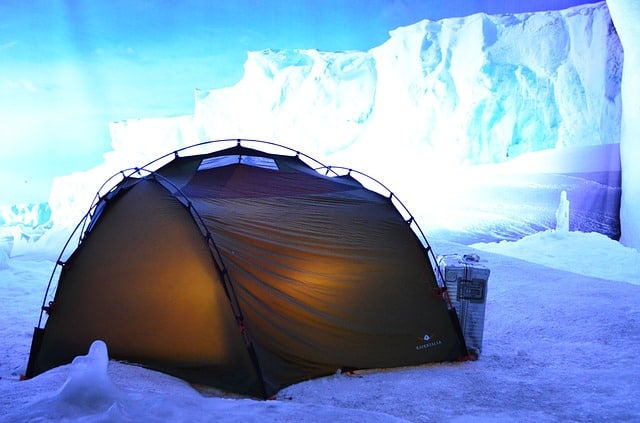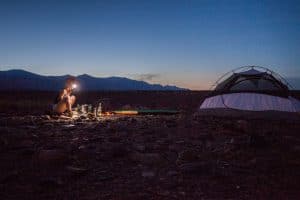The debate on which is the best between a 3- and 4-season tent is quite impressive. Nevertheless, it’s undeniable that most campers own and use the 3-season tents more than their 4-season counterparts.
So does this mean they’re the best? Know that below.
Before I dive into the nitty-gritty, I’ll explain the functionality of each of them to equip you with more understanding. Please make sure that you read between the lines.
Quick Navigation
About 3-Season Tents

Yes! They’re usable in three seasons as their nomenclature has it. 3-season tents can be used for the temperate conditions in summer, fall, and spring. They have various features that support their functions, and I’ll explain most of them.
First of all, the tent is designed to withstand a lightweight performance while offering a great deal of breathability. On the list of weather conditions that the tent can face are mild to average degrees of rainfall, snowfalls, winds, and others.
However, it can’t withstand the extremes of these weather conditions.
Three-season tents often have sufficient vents for proper airflow in the fields, too. While they allow a bit of wind to get in, they protect us well against undesirable levels of the wind.
Also, these tents are designed to effectively block rainfall. Some of them even have a rainfly to protect windy rainfalls from finding its way in.
Also, this tent is ever easy to assemble and disassemble, leave alone to transport. It features a lightweight, aluminum frame that makes it overly light in weight.
Despite such weight, the frame is still sturdy enough to withstand most external forces from the weather and other sources. The body material is also light enough for easy transportation. Some of these tents also use clips to join the body to the poles.
Advantages Of Three-season Tents
- They’re easier to carry along with you to the campsite: Most of them are rollable into small bags that are easily carried. Their lightweight supports this.
- They’re more cost-effective than four-season tents: In fact, this is one of the chief reasons why you’ll find most campers using these tents.
- They can be used in most seasons: Out of the four known seasons, these tents can be used in three.
- They’re easy to set up and manage: No three-season tent can prove hard to assemble. When they get damaged, replacing, and or repairing the damaged part is simple and straightforward. Installation is mostly DIY.
- Their storage is easy and simple. These tents will consume little space during storage. They can always be folded into more compact sizes and shapes.
About 4-Season Tents

Four-Season (or winter) tents, on the other hand, are designed to withstand the extremes of weather. It can be used on all the three weather conditions as with the three-season tents, plus winter. That’s a total of four kinds of weather, thus the name. For this reason, they have features that make them qualify to do this.
These tents can withstand the strongest winds, lowest temperatures, and heaviest snowfalls. Their fabrics are highly durable for the abrasive effects of snow.
Four-Season tents’ frames are as well extremely sturdy to bear both strong winds and heavy snow. Ventilation, however, is reduced because the tents’ main condition of use is low temperature. Despite this, they’re still ventilated well enough to allow users to breathe.
Additionally, they’re also spacious. Their interior is large enough to accommodate bulky sleeping gear. There are also numerous and large compartments for storage of personal effects like clothes and food, alongside mountain climbing gear.
Advantages Of Four-Season Tents
- They can withstand very low temperatures without being destroyed.
- They’re large hence offer more storage spaces for your camping gear, clothes, food, climbing materials, and much other camping gear.
- They’re conspicuous enough to be spotted in the storms. The conspicuousness is both in their colors and sizes
- They save a fortune with regard to usage in oppressive climates. If you decide to use the three-season tents, anyway, you’ll end up with increased maintenance costs.
Which One Is Right For You?
You already know it! The behavior of your camping environment is the critical determinant of your choice of tent. As a rule of the thumb, harsh environments with stormy winds, heavy icefalls, and extremely low temperatures, among others, will indisputably need a four-season tent.
This is because, in such temperatures, you need a reliable, warm, and flexible tent.
Otherwise, if you’re in temperate conditions, all you need is a well-ventilated, lightweight, flexible, cheap, and easy-to-maintain tent. All three-season tents fit in this category.
However, if you’re also a camper during the winter, but the weather conditions aren’t too intense, you can use the three-season tent.
If you use it when the weather conditions are quite harsh, it will get damaged such frequently that you’ll need to do repairs and replacements all the time. This will negatively impact your cost of maintenance, which will render it too expensive.
Which One Is The Best?
Again, I’ll recite that each of them can be the right one, depending on your surroundings.
However, the three-season tent is a lower budget option that cuts across three climates, with a possibility of working in winter, too.
Further, there are various options with thicker fabric and more robust frames that can work in extreme temperature cases. This makes them suit all climates without a worry.
So, the primary factor to consider before purchasing any of these two tents is whether or not you’re going to camp in the winter, and perhaps whether the weather conditions are harsh (which is usually the case in winter). Other factors like color, price, size, and aesthetics, among others, are a person’s own preferences.
The Bottom Line
Both the three- and four-season tents are great and ideal, but for specific conditions. You’ve seen all the terms under which you can use each of the tents to camp. You’ve also had a glance at the many advantages that each has.
Therefore, you’re able to judge the best one for your situation. I hope this blog was both useful and helpful to you.
Meanwhile, have good luck from me.
Take care of yourself.



